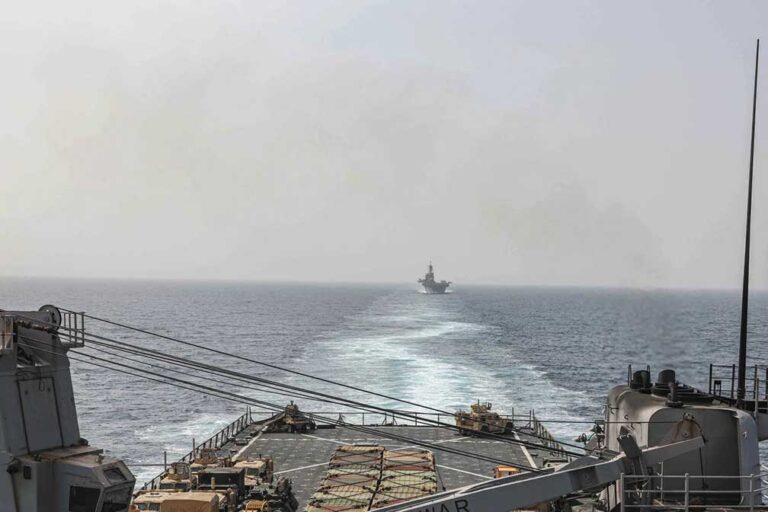Unprovoked attacks by Yemen’s Houthi rebels on commercial shipping vessels in the Red Sea are beginning to have an impact on world trade as shipping costs increase and delays are seen at ports of call on both the east and west coasts of the U.S. Ultimately, the delays will impact the trucking industry as carriers will have to adjust schedules, and deliveries to major U.S. retailers will be delayed. The impacts will likely be felt by summer.
On Jan. 4, 2024, an armed unmanned surface vessel launched from Houthi-controlled Yemen got within a “couple of miles” of U.S. Navy and commercial vessels in the Red Sea before detonating, just hours after the White House and a host of partner nations issued a final warning to the Iran-backed militia group to cease the attacks or face potential military action.
Vice Admiral Brad Cooper, head of U.S. Navy operations in the Middle East, said the Jan. 4 attack was the first time the Houthis had used an unmanned surface vessel (USV) since their harassment of commercial ships in the Red Sea began after the outbreak of the Israel-Hamas war. The Houthis have, however, used USVs in years past.
Fabian Hinz, a missile expert and research fellow at the International Institute for Strategic Studies, said the USVs are a key part of the Houthi maritime arsenal and were used during previous battles against the Saudi coalition forces that intervened in Yemen’s war. They have regularly been used as suicide drone boats that explode upon impact.
Most of the Houthis’ USVs are likely assembled in Yemen but often fitted with components made in Iran, such as computerized guidance systems, Hinz said.
International Maritime Organization Secretary-General Arsenio Dominguez told the council that as a result of the Houthi attacks, around 18 shipping companies have rerouted their vessels around South Africa to avoid the risk of being hit.
This new route, around the Cape of Good Hope, adds 10 to 14 days to a typical trip. The additional fuel cost for the longer route is impacting shipping rates, and the crisis has led to a 25% reduction in commercial traffic through the Suez Canal. At the current course, delays in shipping will disrupt the supply chain and add months to typical deliveries.
The actions of the Houthis are in response to Israel’s attacks on Gaza following terrorist attacks by Hamas on Israel in October. According to U.S. deputy ambassador Christopher Lu, Iran is financing the rebel attacks in the Red Sea.
“(Iran) can continue its current course, or it can withhold its support without which the Houthis would struggle to effectively track and strike commercial vessels navigating shipping lanes through the Red Sea and Gulf of Aden,” Lu said. He added the Houthi attacks “pose grave implications for maritime security, international shipping and commerce.”
The Yemen-based militants have carried out at least 23 attacks since Dec. 19. Since the new year began, Houthi has stepped up its attacks using armed unmanned surface vessels. Although none have reached targets, these vessels have regularly been used as suicide drone boats that explode upon impact.
A statement by the U.S. and 12 other countries on Jan. 7 offered what amounted to a final warning to Houthi rebels to cease their attacks on vessels in the Red Sea or face potential targeted military action.
“The Houthis will bear the responsibility of the consequences should they continue to threaten lives, the global economy, and free flow of commerce in the region’s critical waterways,” the statement said. The United States and other countries are sending additional ships to the southern Red Sea to provide protection for commercial vessels passing through the critical Bab el-Mandeb Strait.
A senior Biden administration official declined to provide the Associated Press with detailed rules of possible engagement if the attacks continue but underscored that the Iranian-backed Houthis should “not anticipate another warning” from the U.S. and its allies.
The official, who spoke on the condition of anonymity under ground rules set by the White House, spoke soon after the countries issued a joint statement earlier Wednesday condemning the attacks and underscoring that international patience was strained.
The attacks are causing one of the largest threats to worldwide trade since the COVID-19 pandemic. According to the news source El Pais, “The impact on freight rates has been astronomical: they have almost tripled since the attacks….” The escalating cost of transport threatens the world economy with a further inflationary setback, although experts are confident that the effect will be limited.
In a Dec. 8, 2023, Washington Post article, Ryan Petersen, CEO of logistics company Flexport, said shipping carriers expect most services to avoid the Red Sea through China’s Lunar New Year festival. The two weeks leading up to the celebrations is a peak period for shippers, who rush to deliver goods before the holiday, which starts Feb. 10.
“It’s about an 8% longer journey, which is going to drive prices up quite a bit for ocean freight — that’s a material impact on prices for the goods themselves,” Petersen said of the rerouting of shipping around the Cape of Good Hope. The rising costs will affect the price of “most of the stuff that you see in all the stores,” other than food, raw materials, and energy, he added.
In the meantime, the United Nations (UN) is not standing still. A number of resolutions have been adopted condemning the Houthis, including a statement by the UN Security Council that “attacks against commercial vessels transiting the Red Sea, and in light of ongoing attacks, including a significant escalation over the past week targeting commercial vessels, with missiles, small boats, and attempted hijackings” must cease.
A Jan. 3 statement from the White House noted, “Ongoing Houthi attacks in the Red Sea are illegal, unacceptable and profoundly destabilizing. There is no lawful justification for intentionally targeting civilian shipping and naval vessels. Attacks on vessels, including commercial vessels, using unmanned aerial vehicles, small boats, and missiles, including the first use of anti-ship ballistic missiles against such vessels, are a direct threat to the freedom of navigation that serves as the bedrock of global trade in one of the world’s most critical waterways.”
Time will tell what actions will be taken against the Houthis, as well as their Iranian supporters, if the attacks on commercial shipping vessels continue. In the meantime, all stakeholders, include trucking firms, can only wait and hope a repeat of pandemic supply chain issues is not in the offing.
The Associated Press contributed to this report.
Since retiring from a career as an outdoor recreation professional from the State of Arkansas, Kris Rutherford has worked as a freelance writer and, with his wife, owns and publishes a small Northeast Texas newspaper, The Roxton Progress. Kris has worked as a ghostwriter and editor and has authored seven books of his own. He became interested in the trucking industry as a child in the 1970s when his family traveled the interstates twice a year between their home in Maine and their native Texas. He has been a classic country music enthusiast since the age of nine when he developed a special interest in trucking songs.











